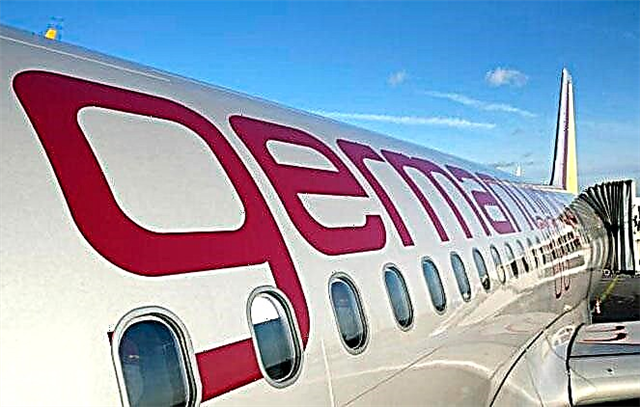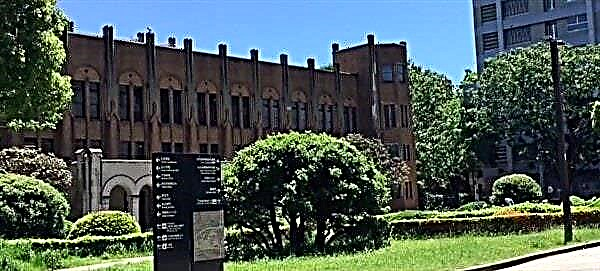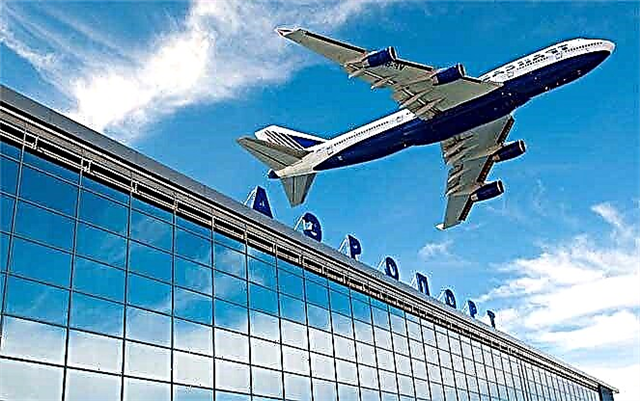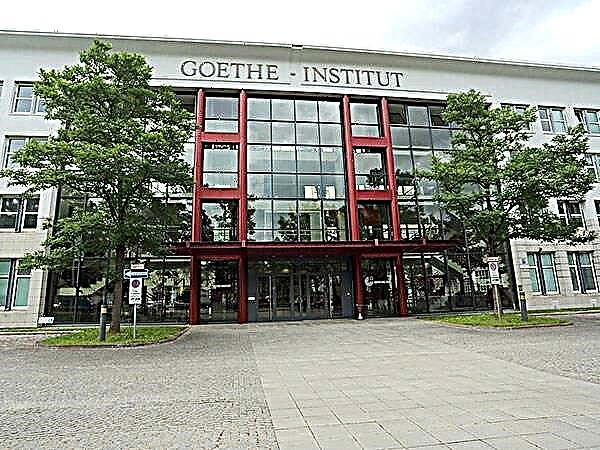For many years Germany has been striving to develop cultural interaction with other countries and peoples. The government, public organizations and other structures strive to do everything possible to popularize the German language and culture in different countries of the world. For this purpose, one of the most effective non-governmental organizations, the Goethe Institute, was created, which contributes to the expansion of international cooperation in the field of culture abroad.

What is the Goethe Institute
The Goethe Institute (German Cultural Center named after Goethe, German - Goethe-Institut) was established in 1951 as the successor to the German Academy founded in 1925 and bears the name of one of the outstanding Germans - the poet, thinker, philosopher and naturalist Johann Wolfgang von Goethe. The main task of this organization, which is funded by the German government, is to promote the German language and culture on a global scale.
The Institute provides up-to-date information on the cultural, social and political life of Germany, and its programs promote cultural exchange.
Today there are representative offices of the Goethe-Institut in 90 countries of the world. In total, these are over 150 branches that carry out active cultural and educational activities abroad. Along with the offices of the Goethe-Institut, there is a whole network of cultural centers, societies, reading rooms, where you can get information about all aspects of life in Germany, news in the field of art, education, music, cinema, theater, literature in Germany.
At the same time, the Goethe Institute is a network of educational centers in Germany that organize and conduct various examinations and language courses. Within their walls, a wide variety of projects and programs are being implemented, which are designed for participants of any age - from primary school to mature.

The language training program for specialists wishing to adapt their professional skills to German standards is especially highly appreciated. As a result, today already thousands of people can boast that they have language certificates issued by this organization. In addition, the institute pays scholarships to foreign students who study in Germany and actively study the language.
German Courses: Study Options
A certificate issued by the Goethe Institute is considered a full confirmation of the level of knowledge of the German language and is sufficient for employers, government agencies (including emigration ones), as well as for admission to educational institutions. Obtaining a certificate is also relevant for persons intending to live and work on the basis of the au-pair principle; in family reunification and in many other cases.
It should be noted that the Goethe-Institut is the only official organization outside Germany whose diplomas are recognized in all parts of the world. At the same time, persons studying German can take the exam at any representative office of the Goethe-Institut or a licensed examination center that is convenient for them.
In accordance with the unified European standard, there are six levels of German language acquisition: A1, A2, B1, B2, C1, C2.
For example, a Goethe certificate A1 means that its owner has successfully mastered the very first (initial) level of knowledge of the German language out of six possible. This level provides that a person is able to understand elementary concepts at a basic level and is able to give answers to the simplest questions.

Level B1 implies that a person is able to conduct a confident conversation on well-known topics, describe his feelings, thoughts, situations.
Knowledge of the language and grammar at the C2 level assumes that the person has mastered the language almost perfectly and is able to maintain a conversation at a fast pace on almost any topic.
Courses in Russia
You can take language courses and exam preparation in Russia at three representative offices of the Goethe-Institut. There are also centers that have the right to take exams according to approved programs.
Courses for adults are divided into standard, intensive, combined and online group courses. They differ in content, timing and cost. Individual questions regarding training can be clarified by contacting a specific German language center or its branch.
Courses for children and youth are presented by courses for first graders (Otto Oktopus), for adolescents 10-13 years old, as well as for boys and girls 14-16 years old - levels from A1 to C1.
Examination trainings in preparation for certification for the Goethe-Institut certificate differ in the objectives and content of the course, duration of training and cost.
These are trainings for the Start Deutsch 1 exam (A1, focus - immigration), for the TestDaF exam - traditional preparation and online trainings (B2 and higher, preparation for studying at a German university), as well as for the Goethe-Zertifikat C2: Grosses Deutsches Sprachdiplom (exam for advanced knowledge of German at level C2).
There is a system of discounts for regular listeners and students. You can learn more about this and other activities of the institute by contacting the official website of the organization, where you can find the course schedule and other information.
Courses in Germany
A more preferable option is to take courses directly on the territory of Germany. Here, the language course is complemented by immersion in the culture and rhythm of the country's life, which contributes to a better and faster assimilation of knowledge. True, this approach provides for a completely different level of self-organization and cost.
A range of intensive and super-intensive courses is offered to choose from (differ in duration, number of academic hours and program); weekend evening courses (courses of various lengths are available), exam preparation courses (training and preparation for TestDaF, training and preparation for mastering levels B1, B2, C1, C2).
Various accommodation options are provided: separate apartments, student dormitories, departmental hotels or living in a separate room with a German family. Utilities (electricity, heating, water) are usually included in the course price.
Online Courses
If there is a lack of time or for other reasons that do not allow attending classes on site, a number of online courses are provided. Standard and intensive courses are offered. In both cases, registration on the site is required to submit an application.
The number of classes for different programs is different. For example, in 2021, the standard online course for language level A1 had a duration of 18 weeks and included 9 virtual sessions, for level A2 - 16 weeks and, accordingly, 8 virtual sessions. The intensive course for the A1 language level takes 12 weeks and involves 8 virtual sessions, A2 - exactly the same.

In this case, language learning can be combined with work, travel, creativity. In the modern world, this method is becoming more and more relevant.
The applicant is only required to create a personal account on the portal and have a set of appropriate devices: a headset, tablet, smartphone, laptop, personal computer.
Exams and Tuition Fees
All examination programs of the Goethe-Institut are developed in close cooperation with the European Association of Foreign Language Examination Boards (ALTE) and comply with the Common European Framework of Reference for Languages.Registration on the portal is required to register for the exam. You can take the exam at any language level - both in Germany and in other countries.
At the same time, the Goethe Institute offers its own system of examinations for persons studying German as a foreign language (Deutsch als Fremdsprache, DaF) at any language level up to C2 inclusive, with TestDaF passing. In addition, you have the opportunity to try your hand at passing the OnSET German language proficiency test, the results of which are submitted together with an application for a scholarship from the German Academic Exchange Service - DAAD, as well as to pass the written part of the mock exam at the chosen level. The cost of the trial exam B1 is 1000 RUB, the trial exam C2 is 1300 RUB.
It should be noted that the Goethe-Institut provides its premises for writing examination papers and provides highly qualified examination support for students of various universities in Germany studying by correspondence.
One of the most important questions for applicants is the cost of training and exams. For example, in 2021 in Moscow, the cost of a specific course is usually 28-38 thousand rubles. At the same time, education for children costs about 10 thousand rubles less than for adults. In representative offices of the Goethe-Institut in St. Petersburg and Novosibirsk, prices can vary up and down.
The cost of a course of study in Germany for adults, depending on the specifics, varies from 1500 to 2500 euros. The children's course costs about twice as much.
Online courses are also not cheap: for example, one such course lasting 9 virtual sessions (18 hours) in January-May 2021 cost 35 thousand. True, there is an option to pay by installments. But, one way or another, it is necessary to clarify the current prices for each individual language course.
Testing
To determine the level of knowledge of the German language, it makes sense to take a test at the branch of the institute in which you are planning further studies.

Registration for testing can be done on the Institute's portal. If desired, the option of passing the primary test online is available, where anyone can test themselves.
Suggestions for teachers of German
The Goethe Institute conducts refresher courses for teachers both remotely and in full-time. Over a thousand events of this kind are held annually. It is possible to study in Russia (and the countries of the former USSR), directly in Germany, as well as in the format of online classes. A wide range of teaching materials is available in both printed and digital form.
There is an opportunity to apply for a Teacher Scholarship. To do this, it is necessary to become a participant in refresher courses under the Goethe Institute program on the territory of the Federal Republic of Germany and to prove yourself worthily in studies.
Encouraging the learning of the German language
In the modern world, informational - linguistic, cultural, professional - exchange plays an increasing role. In this regard, the Goethe Institute has a wide range of programs aimed at cooperation with public organizations, educational institutions and groups of people, one way or another connected with Germany, and stimulating the study of the German language and culture.
School affiliate programs
The Goethe-Institut considers it extremely important to maintain contacts with hundreds of schools around the world that are actively promoting the German language. This collaboration is part of the extensive Schools: Partners of the Future program, which was adopted by the German Foreign Ministry and brings together several leading organizations in the field of education and culture. At the moment, the Goethe Institute supervises almost 600 schools around the world, fourteen of them in Russia.
Environmental competition for schools
For several years, the Goethe-Institut has been holding a competition "School for Ecology: Think, Explore, Act!" locality, region, city or village. Schoolchildren conduct independent research on environmental issues in German, drawing public attention to current topics.
Children's Online University
The German Children's Online University is a completely free online project of the Goethe-Institut for children from eight to twelve years old. A child can start learning German without leaving home in a convenient playful way, and parents can monitor their progress in real time. This course can also be used by teachers of the German language in schools who are interested in expanding the methodological base, which is available on the website for free in the form of games, tasks and other didactic materials.

The online children's university "Kinderuni" (kinderuni) helps children find answers to questions about the phenomena of the world and at the same time introduces them to the German language, allowing them to study it from an early age.
Aluminum portal
German alumni - this is the name of people who, to one degree or another, are associated with professional activities with the Federal Republic of Germany. Such, for example, are graduates of German educational institutions both in Germany itself and abroad, students of refresher courses or language courses, employees of various organizations and institutions who once worked in this country.
In order for these people to have the opportunity to maintain contact and communication with each other and with Germany, with the support of the Goethe Institute, the Portal of German Aluminum was created, where online communication takes place, the search for answers to questions of interest, the exchange of experience and information, for example, regarding education in Germany, family reunification.
The portal offers visitors the opportunity to use the international labor exchange, to get acquainted with information about potential places for further training and about events of German organizations abroad.
Higher education in Germany
Not so long ago, in order to enter a German university, applicants from the countries of the former USSR had to either finish their first year at a university in their homeland, or take special training courses in colleges in Germany. However, with the advent of the "Bridge to a German University" program, it became possible to enter one of the higher educational institutions in Germany immediately after leaving school (provided that the university is a partner of the program). In the future, the graduate is assisted in finding a job in Russia.
The Bridge to the German University is a scholarship program from the Goethe Institute that provides language and subject training and an introduction to German university life.
The program is designed for students in grade 9 with learning outcomes above average in mathematics, computer science, science and technology, who speak German at least at level A2 and above. To participate in the program, you must provide a parent or guardian consent document and be interviewed.

For students in grades 10 or 11, participation in the paid program “Bridge to a German University. Intensive course ”.
Professional language training programs
"The German language and the profession" is another project that the Goethe-Institut is successfully implementing. Its essence lies in subject language teaching in relation to a specific profession using the CLIL method. As a result, the person who took part in this program becomes more competitive in the labor market and has more chances for a successful career.
The target groups for the program are high school students, secondary vocational and university students, and German language teachers.
Expansion of cooperation in the field of education
Another significant project is the "Winter Academy", the purpose of which is to expand cooperation between educational institutions of the EU and Eastern Europe. The program has a reputation for being very promising and is currently only gaining momentum.
The project is the result of joint activities of the Goethe-Institut and the University of Bremen, as well as their foreign partners, including from Ukraine, Russia and Georgia. Within the framework of the project, it is planned to create a network university that will unite the countries and leading universities of the Eastern Partnership countries and provide all students with the opportunity to study intercultural disciplines and exchange educational experience.
Children's summer camp
Goethe Camp is a summer camp for children from 10 to 13 years old, in which the Goethe-Institut provides language training for children at levels A1 (beginner) and A2 (basic) according to its own program in a fun interactive manner appropriate to the age of the students. Training takes place in the morning in groups of no more than sixteen people. The total duration of the course is 40 academic hours.
After lunch, the pupils are offered the program of the German Children's University, sports and cultural events are provided.

Goethe Camp is located on the territory of the children's health camp "Raduga" - Moscow region, Odintsovo district, Pronskoe village. The cost is 56 thousand rubles.
It includes: initial testing, a German language course, six meals a day, an entertainment part, accommodation - separate for boys and girls, multi-bed rooms with a shower and toilet. It is important to submit an application in a timely manner and pay attention to the current bonus system, with which you can reduce the price.
German as a first second foreign language
Currently, German has good prospects of becoming the most frequently chosen second foreign language in curriculum development.
The Goethe Institute, together with partners in the educational field, plans to provide comprehensive assistance to those educational institutions in which German is already taught or is planned in the foreseeable future as a second foreign language.
For this purpose, the project "German - the first second foreign" was created.
The aim of the project is to improve the quality of teaching the German language, to assist teachers and teachers of the German language, to introduce innovative technologies and modern techniques in the language teaching process. The geographic scope of the program is constantly expanding. In 2021, 44 regions of Russia participated in the program, of which 8 were new.
Russian Germans and their support programs
On behalf of the Ministry of Foreign Affairs of the Federal Republic of Germany, the Goethe Institute strongly supports Russian Germans. There are programs to improve the teaching of the German language, various cultural projects, and international ties are being strengthened. All kinds of meetings and seminars are regularly held, assistance is provided to regional libraries, which receive modern literature in German free of charge.
Prospective projects of the institute
The Goethe Institute is dynamically promoting its educational and cultural initiatives around the world, including Russia and the entire post-Soviet space. The organization regularly launches new projects, looking for new partners.
For example, it is worth mentioning the daf project, which provides for the creation of a special library fund for in-depth study of the German language. Any student or teacher engaged in such a study will be able to order special materials for themselves regarding the most difficult nuances of the German language, at each of the levels from A1 to C2.
The lernplattform universal educational platform from the Goethe-Institut has also gained popularity among German learners.
Where to look for a representative office of the Goethe Institute
The Goethe Institute has branches in the Russian Federation. There are three permanent centers of the Goethe Institute functioning here: in Moscow, St. Petersburg and Novosibirsk. These representations are implementing programs of linguistic and cultural cooperation, adapted to modern requirements. Their contact details and addresses can be easily found on the official website.
In addition, Russia has a partnership program for interaction between the Goethe Institute and regional educational centers, whose teachers have the right to take an exam on its behalf. The list of licensed examination centers in the Russian Federation can be found at the link on the institute's website.
In Ukraine, Belarus and other CIS countries, similar programs operate and there is a network of regional examination centers. A complete map of representative offices and examination centers is located in this section. It should be mentioned that the grades after passing the exam are announced at the same examination center.
Finally
The Goethe Institute offers a wide range of language training programs for students who are ready to live and work in the Federal Republic of Germany, as well as those who are simply interested in modern culture and social life in Germany. It is not just about the global coverage of everyone who in one way or another wants to connect their life and professional activities with Germany and the German language, but about standardized teaching language and cultural classes with additional options in the form of internships and international exchange.
Today we can talk about the formation of a full-fledged networked international educational structure, which arose in the information field on the basis of common interests and values. In this regard, a single individual has ample opportunities for self-realization, obtaining and improving professional skills and mobility in every sense of the word.











